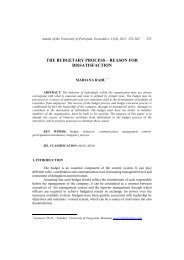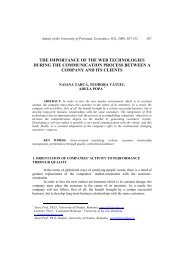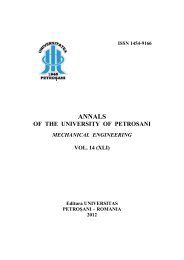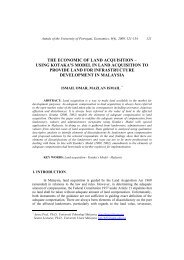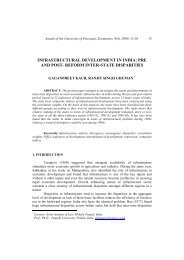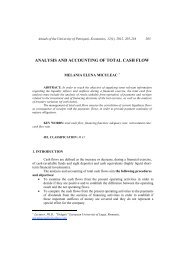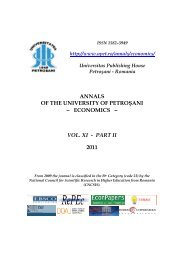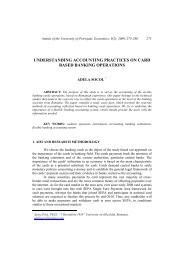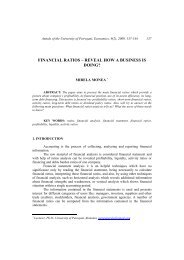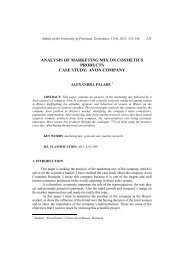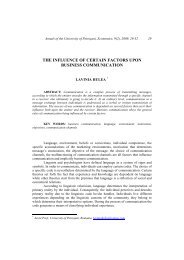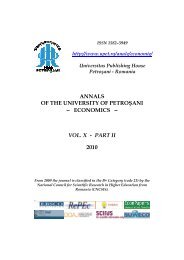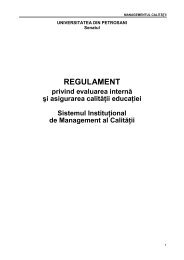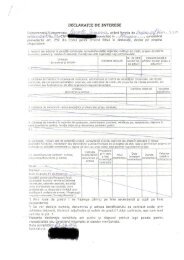annals of the university of petroÅani â¼ economics â¼ vol. xi - part i ...
annals of the university of petroÅani â¼ economics â¼ vol. xi - part i ...
annals of the university of petroÅani â¼ economics â¼ vol. xi - part i ...
You also want an ePaper? Increase the reach of your titles
YUMPU automatically turns print PDFs into web optimized ePapers that Google loves.
20 Biriescu, S.; Butuza, A.<br />
From institutional viewpoint <strong>the</strong> Government <strong>of</strong> Romania has responded to <strong>the</strong> new<br />
challenges generated by <strong>the</strong> post-accession period designating <strong>the</strong> institutions, <strong>the</strong> units<br />
in charge with <strong>the</strong> implementation and administration <strong>of</strong> <strong>the</strong> EU financial assistance via<br />
structural instruments (H.G. 497/2004). The definitions <strong>of</strong> <strong>the</strong> programming documents<br />
(Community Support Framework (subsequently replaced by <strong>the</strong> National Reference<br />
Strategic Framework), Operational Programmes, Complement Programme) have been<br />
introduced in <strong>the</strong> Romanian legislation on this occasion, at <strong>the</strong> same time with those <strong>of</strong><br />
<strong>the</strong> key – actors, institutions that will deal with <strong>the</strong> implementation <strong>of</strong> <strong>the</strong> structural<br />
instruments (Management Authority, Monitoring Committee, Payment Authority).<br />
Each Operational Programme will have its own management authority, as follows: <strong>the</strong><br />
Ministry <strong>of</strong> European Integration for <strong>the</strong> Regional Operational Programme, <strong>the</strong><br />
Ministry <strong>of</strong> Economy and Commerce for <strong>the</strong> Sectoral Operational Programme on<br />
Economic Competitiveness, <strong>the</strong> Ministry <strong>of</strong> Transportation, Constructions and Tourism<br />
for <strong>the</strong> Sectoral Operational Programme on transportation and energy infrastructure,<br />
<strong>the</strong><br />
Ministry <strong>of</strong> Environment and Water Management for <strong>the</strong> Sectoral Operational<br />
Programme on environment infrastructure, <strong>the</strong> Ministry <strong>of</strong> Labour, Social Solidarity<br />
and Family for <strong>the</strong> Sectoral Operational Programme on human resources development,<br />
<strong>the</strong> Ministry <strong>of</strong> Administration and Interior for <strong>the</strong> Operational Programme on<br />
administrative capacity development, <strong>the</strong> Ministry <strong>of</strong> Public Finance for <strong>the</strong><br />
Operational Programme <strong>of</strong> technical assistance.<br />
The Operational Programmers will implement <strong>the</strong> priorities established by <strong>the</strong><br />
National Reference Strategic Framework (NRSF). This document wills harmonies <strong>the</strong><br />
national priorities with <strong>the</strong> EU ones, included in <strong>the</strong> Community Strategic Guidelines<br />
for <strong>the</strong> Cohesion Policy. The NDP for 2007-2013 will remain Romania’s internal<br />
working document for <strong>the</strong> Ministry <strong>of</strong> Public Finance. Two major differences can be<br />
noticed between <strong>the</strong> NDP and <strong>the</strong> NRSF, as follows (Ministerul Finantelor Publice,<br />
2008): first, from financing viewpoint, <strong>the</strong> sources for <strong>the</strong> NRSF are exclusively <strong>the</strong><br />
Structural Funds and <strong>the</strong> Cohesion Fund, whereas for <strong>the</strong> NDP <strong>the</strong>re are additional<br />
sources such as national and local investment programmers, external credits, European<br />
Agricultural Fund for Rural Development, etc.; second, <strong>the</strong> NRSF does not address <strong>the</strong><br />
rural development priorities included in <strong>the</strong> NDP since <strong>the</strong>y are supported by <strong>the</strong><br />
National Strategic Plan for Rural Development and financed via <strong>the</strong> European<br />
Agricultural Fund for Rural Development. The national co-coordinator for <strong>the</strong><br />
Structural Instruments management will be <strong>the</strong> Ministry <strong>of</strong> Public Finance. The<br />
Ministry <strong>of</strong> Public Finance will also act as <strong>the</strong> Payment Authority for <strong>the</strong> European<br />
Regional Development Fund, <strong>the</strong> European Social fund and Cohesion Fund<br />
Regional development policy is an ensemble <strong>of</strong> measures planned and<br />
promoted by <strong>the</strong> local and central public administration authorities, having as <strong>part</strong>ner’s<br />
different actors (private, public, <strong>vol</strong>unteers) in order to ensure a dynamic and lasting<br />
economic growth, through <strong>the</strong> effective use <strong>of</strong> <strong>the</strong> local and regional potential, in order<br />
to improve living conditions. The main areas regarded by <strong>the</strong> regional policies are:<br />
development <strong>of</strong> enterprises, <strong>the</strong> labor market, attracting investments, development <strong>of</strong><br />
<strong>the</strong> SMEs sector, improvement <strong>of</strong> infrastructure, <strong>the</strong> quality <strong>of</strong> <strong>the</strong> environment, rural<br />
development, health, education, culture.



